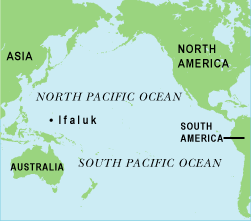Anthropologist Richard Sosis makes several interesting points about fish-sharing and punishment practices on Ifaluk Island in a recent, brief, article. His work appears as one of 13 rejoinders to a very thorough examination of the ethnographic literature of food sharing patterns by Michael Gurven in the journal Behavioral and Brain Research.
Gurven, in the main article, summarizes the literature on foraging and foraging/agricultural societies by proposing four separate models that effectively describe the different patterns of human and primate food sharing: kin selection-based nepotism, reciprocal altruism, tolerated scrounging or theft, and costly signaling. The various rejoinders appreciate his erudite theoretical overview and, as would be expected, offer numerous refinements, rebuttals, and counter proposals to specific points within his paper.
 The rejoinder by Sosis argues for a fifth model for food sharing practices. Among the Ifaluk, the fish they catch cooperatively are divided up according to a formula that the people doing the fishing have no control over. They divide the fish according to the amount of land people own, and the division is actually handled by someone who has inherited the authority to do so in a matrilineal fashion. This pattern, clearly differing from the four models that Gurven has proposed, can best be called “mutualism,” or “mutual coordination of multiple individuals.”
The rejoinder by Sosis argues for a fifth model for food sharing practices. Among the Ifaluk, the fish they catch cooperatively are divided up according to a formula that the people doing the fishing have no control over. They divide the fish according to the amount of land people own, and the division is actually handled by someone who has inherited the authority to do so in a matrilineal fashion. This pattern, clearly differing from the four models that Gurven has proposed, can best be called “mutualism,” or “mutual coordination of multiple individuals.”
Fish caught by individual Ifaluk Islanders are less likely to be shared, but the coordinated effort of a group of people steering, pushing, rowing, and reeling in fish requires the mutualism system of distribution that does not focus on individual ownership of the resource. On other nearby Pacific atolls, where fishers use motorboats and generally catch fish alone, traditional patterns of fish sharing no longer apply. On Ifaluk, the chiefs have forbidden fishers from owning or using motorboats.
Sosis also examines briefly the relationship between food production, consumption, and punishment, particularly of slackers who don’t do their fair share of the work. One punishment on Ifaluk is that the people distributing the cooperatively caught fish may choose to not give any to people who repeatedly do not participate. Also, slackers who do not contribute their fair share in community projects may find that no one shows up to help when they need assistance. For instance, Ifaluk men will cooperatively work, as directed by the chiefs, to put new roofs on people’s dwellings. The shirker may find that not enough people show up to help him with his new roof. One man was humiliated when he had to put a plastic tarp over his house, since not enough men came to help with his re-roofing, a very visible punishment for his slacker habits.
The editors of the journal also chose another authority on the Ifaluk to comment on the paper. Laura Betzig, who was cited elsewhere in this website for her negative reaction to the peacefulness of the Ifaluk (see the Ifaluk article, “But How Much Violence do They Really Experience?” section), responded to this piece by Gurven by describing the Ifaluk Islanders as trapped on a small island under the unjust control of their chiefs. The chiefs work less, take in more, and have more for their children. Why, she asks, do the Ifaluk put up with this injustice?
The answer, according to Betzig, is that they have only two options. They could do the bidding of the chiefs or they could leave. In her article, she describes how, many years ago, she “sat with a bad parasite in the Ifaluk lagoon” thinking about the unjust social order of the island, as she saw it. She realized that “the nearest spit of land, another tiny atoll, was 30 miles to the west across the shark-infested Pacific.” People had nowhere to go to flee the rule of the chiefs. She goes on to describe her own thinking about food sharing, Ifaluk Island, and human interpersonal interrelationships, all of which she sees in terms of conflict rather than cooperation: “Better fighters do best where worse fighters are trapped.” She feels that summarizes human history.
Gurven, Michael. 2004. “To Give and To Give Not: The Behavioral Ecology of Human Food Transfers.” Behavioral and Brain Sciences 27: 543-583. Within that article, see also Sosis, Richard, “Insights from Ifaluk: Food Sharing among Cooperative Fishers,” p.568-69, and Betzig, Laura, “Where’s the Beef? It’s Less about Cooperation, More about Conflict,” p.561-62.